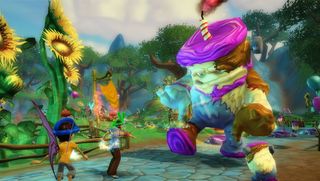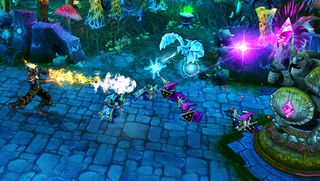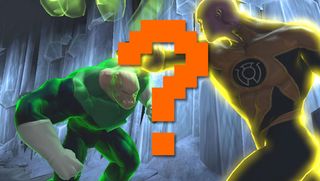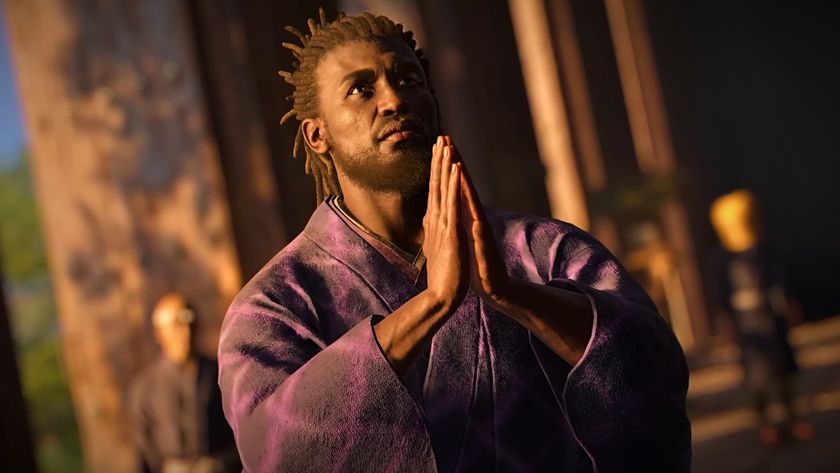Great Debate: Is the free-to-play model better for gamers?
Settling the score over microtransactions

Let the games begin
Free-to-play gaming has been around for years, letting players experience the majority of a game for no cost and leaving it up to them whether or not they'll spend cash on conveniences, exclusive items, and time-saving boosts. But it wasnt until recently that the business model has, for lack of a better phrase, blown the hell up. Now just about every publisher is scrambling to dip its hands into the sweet, sweet F2P ocean as the games industry moves towards a free-er future. Good news, right?
Not everyone agrees. GamesRadar editor Lucas Sullivan thinks that this evolution is for the best, but fellow writer Hollander Cooper is skeptical as to whether this F2P future is utopian or dystopian. Theyve decided to go head-to-head on the topic so they can, once and for all, come to a verdict. Actually, they dont come to a verdict, they just argue close enough.
GR Debate pits two editors in a head-to-head battle to hash over some of gamings hottest topics. Have a subject you want them to discuss? Let us know in the comments and well wrangle some editors to talk it over.

Lucas says: It creates an entirely new market
Lucas Sullivan: When games require huge budgets, nobody wins - developers have to meet unrealistic expectations, publishers dont want to take chances on the little guys, and gamers get tired of the homogeneous market full of me too titles. Free-to-play games require less up-front investment by developers and players alike, able to support small, close-knit communities (like Dungeons & Dragons Online) or millions-strong playerbases (League of Legends) based primarily on the merits of their gameplay.
Hollander Cooper: Nobody wins? Tell that to the people who make Call of Duty - or the millions of people that buy those games every year. Big-budget AAA releases move the industry forward, and the market being created by F2P games is usually weaker, with more misguided attempts at grabbing people's money and fewer high-quality games.

Hollander says: F2P encourages pay to win models
Hollander: Many massive F2P multiplayer games offer awesome gear for money, literally allowing players to pay to win. Not every developer goes down this dark, desperate path when it comes to microtransactions, but some of the most successful F2P multiplayer games do. This completely breaks the competitive nature of multiplayer, and makes it into a battle of not who has the best skills, but who has the biggest bank account.
Lucas: Any success from whatever game youre thinking of is bound to be short-lived. Long term, the pay to win formula spells certain death - when rich kids rule the streets, people will move on in droves to better, more balanced fare. Just as nobody will play a game thats easily hacked, a community (and therefore profits) cant exist when winning is a direct correlation of spending. Its natural selection, really.

Lucas says: It removes all barriers to entry
Lucas: Demos have long been the only way to try before you buy when it comes to gaming (filthy pirates notwithstanding). With the free-to-play model, you can essentially try all you want before putting any money down, letting you get a feel for the game mechanics and features without any investment. When theres no price of admission, theres nothing stopping us from playing any F2P game that looks remotely interesting, instead of taking $60 gambles on unproven concepts.
Hollander: Demos and trials get the job done, too, and they do it without undermining the overall value of the game. The ability to try all you want without putting money down isnt actually good for the game industry, since people who would usually just play a demo and then buy a game are, instead, just able to play indefinitely without giving the games creators any money.

Hollander says: Most F2P games feel incomplete
Hollander: When games are built around the F2P model, theyre usually created with future microtransactions in mind. That means gamers are given a small piece of the experience, and are expected to enjoy being drip fed the additional content that, in a normal game, would have just been included at launch. Its annoying that many games that might have been amazing if created as premium titles end up feeling like cheap knock-offs because of this.
Lucas: But look at the success of MMOs like DC Universe Online: instead of paying for expansions on top of a subscription fee, Sony Online Entertainment lets you pick and choose the content youre interested in and skip the rest. Id gladly expunge unenjoyable side quests or boring, backtracking filler levels from standalone titles if it meant that I could pay less for them.

Lucas says: F2P encourages the pay what you want mentality
Lucas: If the success of countless Kickstarters and Humble Indie Bundles wasnt indication enough, it seems gamers love naming their price. In fact, these payment models seem to evoke the generosity in people, wholl often contribute more than their fair share for sheer love of a project. F2P games work in much the same way - cheapskates can play without paying a penny, while players who want to support the developers work can contribute cash for conveniences and aesthetic status symbols.
Hollander: No arguments here - it totally encourages the pay what you want mentality. And thats a bad thing. People dont want to pay anything - they want everything for free. Developers deserve the right to charge what they want for their game, and you decide whether or not you think its too high by waiting for a sale or not buying it - not by simply deciding to pay less because you dont want to pay more.

Hollander says: F2P doesnt work for single player games
Hollander: Seriously, what are you going to do? Charge people to unlock dialog? Expect them to pay money for the last level? F2P being applied in any way to the single player model is a slippery slope, and considering how angry people get when singleplayer DLC is released for, full retail games, we dont anticipate anyone being happy if Call of Duty or BioShock ends up following a F2P system.
Lucas: Then again, does anyone enjoy paying $60 for an experience that lasts them eight-to-ten measely hours? If microtransactions were to ever be adopted for single player - which, lets face it, isnt likely - they would have to add to the experience instead of subtracting from it. Proto Man and Bass in Mega Man 10 come to mind - I gladly paid a paltry sum to play the same single player portions in an entirely new way.

Lucas says: It forces developers to put gameplay first
Lucas: No matter how little it costs to play a game, one singular principle still holds: if a games not fun, nobody will play it - and, consequently, no one will want to spend money in it. That means that the core elements to a F2P game need to be rock solid - satisfying enough to get players to foster the community and pay cash for transactions that (besides making them look cool or saving real-world time) actually do nothing.
Hollander: No, it doesnt - it forces developers to create a core concept that can be exploited. Sure, the game needs to be fun enough to justify hanging gamers upside down and shaking them until their cash falls out, but the F2P model thrives on creating concepts that take advantage of the player, making it so theres never a truly finished product.

Hollander says: "Paying for convenience" is often paying not to be inconvenienced
Hollander: The common claim that free-to-play games make is that theyre offering the ability to pay for convenience, like experience-boosts and, seemingly minor bonuses. However, most of the time the game is paced in such a way that the grind - without these bonuses - is painfully slow. This means youre usually spending money so that the experience curve is what it should be, instead of actually getting a boost.
Lucas: Free or not, any MMO or progression-based multiplayer is going to incorporate grinding at some level. You just have to ask yourself how valuable your time is, and whether its worth it to you to see more content at a faster pace in exchange for money. Theres no way that being able to see everything a game has to offer, without paying a dime, could be an inconvenience for anyone but the developers.

Ultimate judgment
Weve watched these two make their claims - but only you can decide whos right and whos wrong. Did Hollander sway you to shun free-to-play like the plague? Are you done with console games forever after hearing Lucas sing F2Ps praises? Or are they both foolish simpletons with no grasp of the world around them? Leave a comment below letting us know who you think won, or if you think theres another angle to the argument altogether. And dont worry about hurting their feelings - theyre more focused on the whole punishment by death thing to fret over dissenting opinions.
Want to know what all the free-to-play hubbub is about? Check out our list of the best free MMORPGs and the best overall MMORPGs.
Great Debate pits two editors in a head-to-head battle to debate some of gamings hottest topics. Have a subject you want them to discuss? Let us know in the comments and well wrangle some editors to talk it over.

Lucas Sullivan is the former US Managing Editor of 12DOVE. Lucas spent seven years working for GR, starting as an Associate Editor in 2012 before climbing the ranks. He left us in 2019 to pursue a career path on the other side of the fence, joining 2K Games as a Global Content Manager. Lucas doesn't get to write about games like Borderlands and Mafia anymore, but he does get to help make and market them.

Assassin's Creed Shadows was originally envisioned without Yasuke, but Ubisoft wanted the full feudal fantasy: "We were sort of making a stealth tank, and it didn't quite work"

Assassin's Creed Shadows lead says dual protagonists are "a cool thing" the new action RPG "does better than what we've done in the past"

Assassin's Creed Shadows was originally envisioned without Yasuke, but Ubisoft wanted the full feudal fantasy: "We were sort of making a stealth tank, and it didn't quite work"

Assassin's Creed Shadows lead says dual protagonists are "a cool thing" the new action RPG "does better than what we've done in the past"








